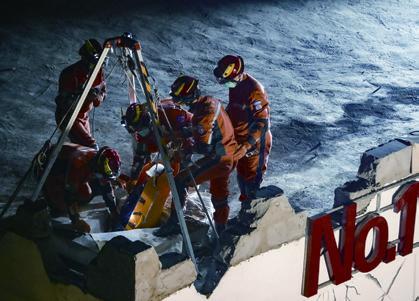A Helping Hand
2019-11-18ByYuanYuan
By Yuan Yuan

It was the middle of March and most places in Mozambique were in chaos and ruins after Cyclone Idai devastated the country, affecting over 70,000 people. Buzi, a relatively populous district in Sofala Province, was dangerously isolated until China Search and Rescue Team (CSAR) managed to land there.
Dispatched at the request of the Mozambican Government, CSAR deployed 65 members, including medical specialists, search and rescue personnel, logistics personnel and liaison officers. Unlike other rescue teams in Mozambique, which focused mainly on medical services and evaluation, it also had water rescuers and rubber boats. In total, CSAR members carried about 20 tons of materials and equipment with them to Mozambique.
Fulfilling tasks
“We were one of the fi rst teams to arrive at the devastated areas,” said Fu Jie, CSARs liaison officer. “In Beira (a city in Mozambique), 80 percent of the buildings were destroyed. People had no food or clean water.”
“Our efforts were well-received by Mozambicans,” Fu said. “The local people were very friendly to us. They recognized our fl ag and uniform, and could even speak some Chinese with us.”
Cholera and malaria started to encroach upon the country and one of the teams major tasks was to provide medical treatment for victims.
“In Chinas 18 years of participation in international disaster relief missions, there had never been this type of epidemic situation,” the deputy team leader of CSAR Wang Manda said during an interview with China Global Television Network. “It was a very dangerous situation for our members.”
Mozambican President Filipe Nyusi also met with CSAR members, who were selected to represent international search and rescue teams participating in the relief operations for their outstanding performance.
The African mission was CSARs first overseas assignment since its formation. The team was constituted after the Ministry of Emergency Management (MEM) was established as part of Chinas reform of state institutions in March 2018. The new ministry took over 13 mostly disaster relief-related responsibilities from other organizations. CSARs duties include fi refi ghting, disaster relief, geological disaster prevention, drought and fl ood control and prairie fi re control.
Shang said CSAR is set to be the model for the construction of search and rescue strength in China and will help lift the capability of rescue teams in the country.
“We know that China has created many other rescue teams and that it is working on developing its national assessment criteria, which we believe, will be based on international standards,” Rajasingham said. “Chinese rescue teams are very welcomed in other countries due to their high professional performance and advanced equipment.”
Shang stressed that China has close connections with relevant international agencies such as the UN Office for the Coordination of Humanitarian Affairs and has developed very good bilateral relations with many countries.“China will offer more necessary support to these countries, making full use of its advantages in remote sensing technology and its capabilities in disaster forecast and monitoring, and international rescue,” he said.
In addition, China will further enhance international cooperation on emergency management and disaster relief by establishing a cooperation mechanism with countries participating in the Belt and Road Initiative, according to Shang.
“Next year, China will host a conference in Beijing to promote cooperation in disaster relief among Belt and Road Initiative participants,” he said.
